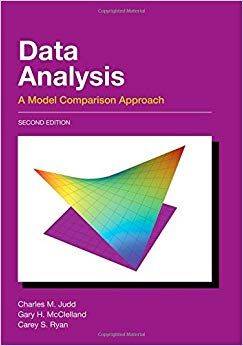
Download Data Analysis: A Model Comparison Approach, Second Edition PDF EPUB
Author: Author
Pages: 328
Size: 1.085,04 Kb
Publication Date: August 29,2008
Category: Statistics
This totally rewritten classic textual content features many new good examples, insights and topics which includes mediational, categorical, and multilevel versions. The authors display how all evaluation of variance and multiple regression could be completed within this framework. Noted because of its model-comparison strategy and unified framework predicated on the overall linear model, the publication provides visitors with a larger understanding of a number of statistical techniques. This constant framework, including constant vocabulary and notation, can be used throughout to build up fewer but better model building methods. Substantially reorganized, this edition offers a briefer, even more streamlined study of data analysis. The rest of the publication builds on these versions.
The publication opens with a synopsis of data evaluation. The book is valued by all because of its comprehensive treatment of ANOVA, multiple regression, nonindependent observations, interactive and non-linear versions of data, and its own guidance for dealing with outliers and various other problematic areas of data evaluation. The model-comparison strategy provides many perks:
- It strengthens the intuitive knowledge of the material therefore increasing theĀ capability to effectively analyze data later on
- It offers even more control in the evaluation of data in order that visitors can apply the ways to a broader spectral range of queries
- It reduces the amount of statistical methods that must definitely be memorized
- It teaches readers how to be data analysts rather than statisticians. A protected internet site featuring additional illustrations and issues with data models, lecture notes, PowerPoint presentations, and class-tested exam queries is open to adopters. All of the necessary ideas for statistical inference utilized throughout the publication are launched in Chapters 2 through 4.
Designed for advanced undergraduate or graduate classes on data analysis, stats, and/or quantitative methods trained in psychology, education, or various other behavioral and social technology departments, this publication also appeals to experts who evaluate data. Chapters 5 - 7 concentrate on regression analysis, accompanied by evaluation of variance (ANOVA), mediational analyses, non-independent or correlated mistakes, which includes multilevel modeling, and outliers and mistake violations. This materials uses SAS but can simply be adapted to various other programs. A working understanding of fundamental algebra and any multiple regression system is assumed.
See also